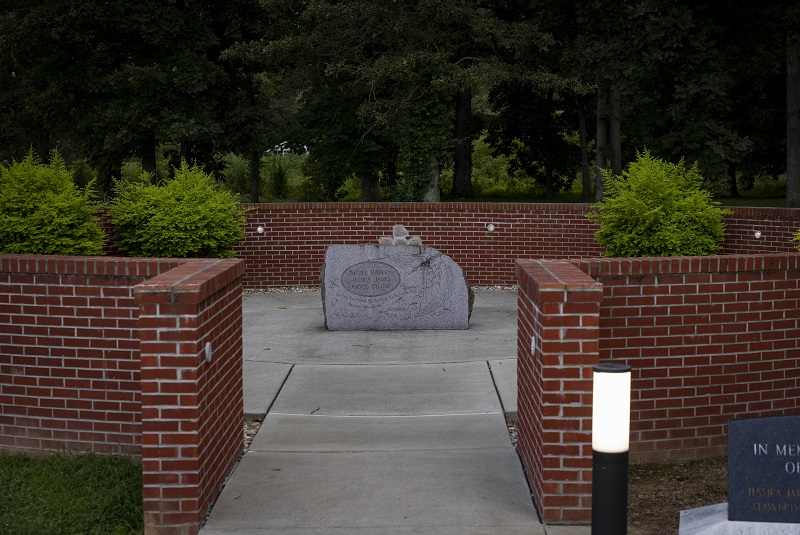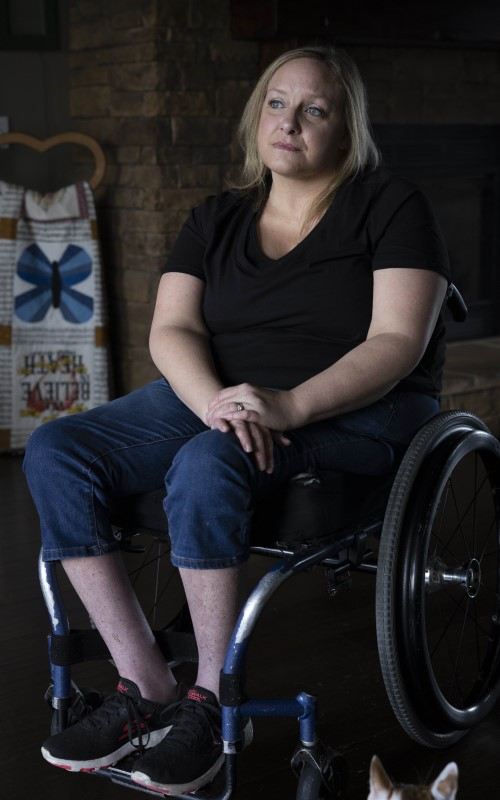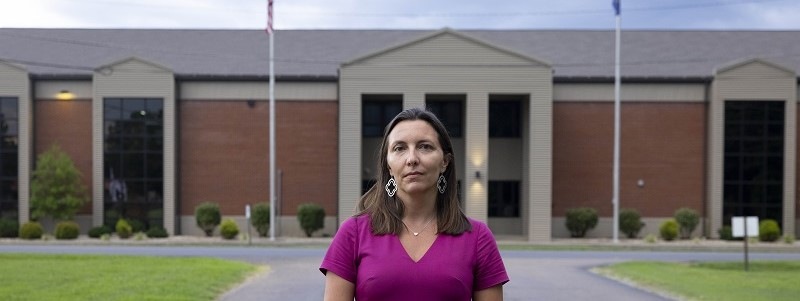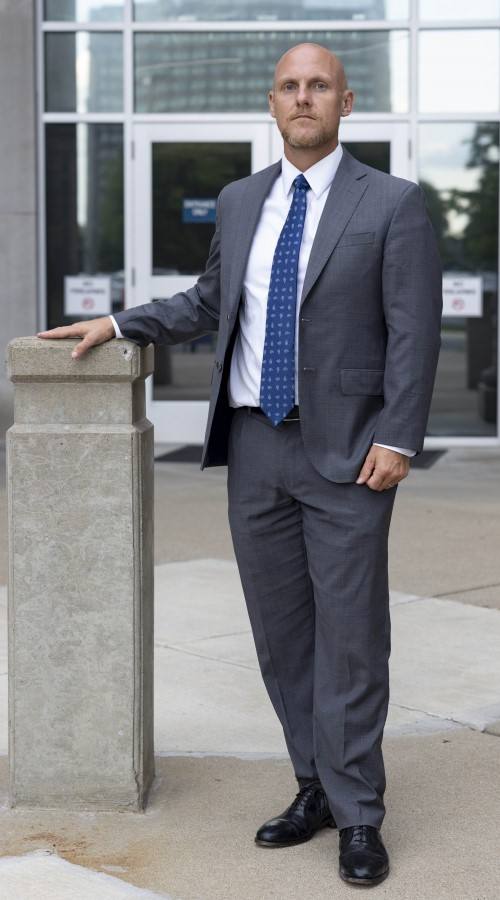A school shooting shattered a town in 1997. Now the gunman could get parole.

A memorial for three girls who were killed in a school shooting in 1997 is open to the public in West Paducah.
13:30 JST, August 29, 2022

Missy Jenkins Smith, 40, sits in her home on Aug. 8, 2022, in Kirksey, Kentucky.
WEST PADUCAH, Ky. – At first, Missy Jenkins Smith thought the sound of gunfire at her Kentucky high school was a bad joke. Her prayer group had just said, “Amen,” and their day was about to begin. Then one of her classmates fell to the floor, shot in the head.
Another student was hit. Then another. And suddenly, the 14-year-old boy wielding a Ruger .22 fired seven bullets indiscriminately toward the teens gathered inside Heath High School on Dec. 1, 1997, the Monday morning after Thanksgiving break.
Jenkins Smith dropped to the tile floor, struck by a bullet in the chest. A teacher knelt beside her.
“Am I going to die?” she asked.
Jenkins Smith survived but was paralyzed from the chest down at the age of 15 and has used a wheelchair since.
The attack upended the small town of West Paducah, in what was then a rarity in the United States: a school shooting. Three students – Nicole Hadley, 14; Jessica James, 17; and Kayce Steger, 15 – were killed and five others wounded. Michael Carneal pleaded guilty and was sentenced to life in prison. But under Kentucky law, the teenager who claimed to have been bullied was given the possibility of parole in 25 years.
Carneal is up for a hearing next month – a relatively rare instance in which an assailant in a school shooting has been given a chance at release. The proceeding will be held Sept. 19 and 20 over Zoom to determine whether Carneal, now 39, will be released in November.
The prospect of Carneal potentially getting released has reopened wounds for those who still carry the pain from a shooting largely forgotten by America. The case also presents a unique question as school shootings continue to afflict the nation: What should happen to child assailants who decades later become eligible for release?
Privately, survivors and families of the victims in Kentucky have grappled with whether and how to forgive him – and if the pain he has caused makes that even possible.
“I knew this day was going to come,” said Christina Hadley Ellegood, the sister of Nicole Hadley and a leading advocate for victims and survivors of the shooting. “It’s always been something in the back of my mind.”

Christina Ellegood, 40, stands across the street from the school where her sister and two others who were killed in a school shooting in 1997 in West Paducah.
The Paducah area, which meets at the confluence of the Ohio and Tennessee rivers, is a farming community in western Kentucky that is halfway between Nashville and St. Louis. That winter morning over two decades ago was cold and dreary. Inside the high school, students were anxiously returning to class.
The Hadley sisters had just put up Christmas decorations with their family. Jenkins Smith was excited to show off her new Adidas outfit. Hollan Holm was thinking about the Spanish quiz he had in first period. Brittney Thomas, a freshman, couldn’t wait to get back out on the basketball court for a game against a rival school.
A frail boy with curly hair and wire-rim glasses, Carneal was an unremarkable attention seeker in the school of fewer than 500 students, according to classmates. Jenkins Smith, who was in the marching band with Carneal, remembered him more as “a fun person to be around” who loved a good prank.
“I was never afraid of him,” Thomas said, recalling how Carneal once stole her purse and dumped it in the trash as a joke. “I never had a reason to be.”
But he also acknowledged in a 2009 interview with the BBC that he was experiencing “these strange feelings of alienation.” Before the holiday break, Carneal warned classmates that “something big is going to happen on Monday at prayer meeting.”
On Thanksgiving Day, as families sat down to turkey and stuffing, he broke into his neighbor’s garage and stole guns and ammunition.
Four days later, he rode to school with his sister, Kelly. Carneal told her the mysterious-looking package containing rifles wrapped in blankets and duct tape was a science project. He had a handgun in his backpack and ear plugs in his pocket.
“This was supposed to be the best times of our teenage lives,” Kelly Carneal Firesheets wrote in an essay in the 2019 book “If I Don’t Make It, I Love You: Survivors in the Aftermath of School Shootings.” “But then, my little brother brought a gun into our school and sent the entire world to hell in a handbasket.”
Before the start of school, a daily announcement echoed through the lobby at Heath High School: “Time to pray!” The informal morning tradition brought together teens to pray about whatever was on their mind that day, from a test they didn’t study for or a grandparent in failing health.
As the students held hands, one of them requested: Let’s pray for our safety.
“I thought that was so weird – ‘Why are we praying for that?'” Thomas recalled. “That had never been a prayer request before.”
A few feet away, Carneal put in his ear plugs and took the Ruger pistol out of his bag at around 7:45 a.m.
“I had heard in my head that I better do it because time was running out,” he said in the 2009 documentary “Going Postal.” “I kept hearing these different things in my head – ‘Now is the time, do it now.'”
When he started firing, the first three girls – Hadley, Steger and James – dropped to the floor. The chaotic firing that followed hit five students all over their bodies – chest, neck, shoulder, head. Holm played dead, while Thomas, who was not wounded, said she stared down the barrel of Carneal’s gun before a friend grabbed her and they belly-crawled to safety.
“I was like, ‘Who’s got the gun?’ ” Jenkins Smith recalled asking her twin sister in the moment. “And she said, ‘Michael Carneal.’ And I was instantly thinking, ‘Michael did this?'”
Principal Bill Bond slowly approached Carneal after he had fired 10 shots from the clip. The teen placed the gun on the ground, and Bond kicked it away before taking the gunman to his office. After the shooting, Bond recounted to investigators that Carneal had told him that, “It was kind of like I was in a dream, and then I woke up.”
Sitting in her French class, Hadley Ellegood grew worried about her sister. Her classmates urged to see whether Nicole was all right. When the 15-year-old walked out of her classroom, she saw a body on the floor and thought, “I don’t think that person is alive.”
She walked farther toward the lobby and found her sister.
“I just walked right up to where she was at and saw her laying there on the floor,” Hadley Ellegood said. “I remember thinking, ‘I feel like I should be crying right now.’ But I wasn’t crying. I was in so much shock that my body didn’t know how to process or how to handle what I was seeing that I just kind of stood there.”
Steger was pronounced dead at a hospital about 45 minutes after the shooting, and James died during surgery that afternoon. Hadley was pronounced dead when she was taken off life support at about 10 that night.
The school shooting made national headlines for weeks and was denounced by President Bill Clinton. Yet, even while the community was reeling, an unlikely message also hung from a banner at the school the very next day: “We forgive you, Mike.”
The West Paducah attack was among the first school shootings to rock the country – unfolding 16 months before the Columbine High School massacre in Colorado changed the perception of classroom safety.

James Mills, McCracken County District Judge, stands for a portrait in front of the courthouse, on Aug. 8, 2022 in Paducah, Kentucky.
“When Carneal did what he did, he ripped the veil off that feeling of security in school,” said Assistant McCracken County Commonwealth’s Attorney Jamie Mills, “and, obviously, we have not been able to get that back.”
In Kentucky, the state passed a juvenile code in 1986 that allows for life sentences as long as parole is considered after 25 years. At the time, Kentucky prosecutors were given leeway from the state to try teens between the ages of 14 and 17 as adults for serious crimes. But Carneal was charged as a minor. And in October 1998, he pleaded guilty but mentally ill – requiring him to receive mental health care while in prison. He was later diagnosed with schizophrenia.
Carneal has repeatedly challenged his guilty plea, arguing in 2007 that he was too mentally ill to submit the plea and pushing for it to be withdrawn altogether in 2012. Both efforts were rejected.
Hadley Ellegood, who said she has attended every court hearing in which Carneal was present, has been planning for the shooter’s parole board hearing for the last two years, working with the McCracken County Commonwealth Attorney’s Office to make sure victims and family members of the deceased get a chance to speak.
“I felt like everyone else in this community, and everyone else who was affected, has the right for their voice to be heard,” she said.
Officials with Kentucky State Reformatory, where Carneal is being held, did not respond to multiple requests to interview Carneal for this article. It’s unclear whether Carneal will be represented by an attorney or a family member, or whether he will represent himself. John Carneal, his father and a former attorney, did not respond to requests for comment.
Dan Boaz, the commonwealth’s attorney for McCracken County, said his goal is to make sure Carneal remains “incarcerated for as long as he lives.” Although it’s unclear how the Kentucky Parole Board – a mix of appointees from former Republican governor Matt Bevin and Democratic Gov. Andy Beshear – will act, the bar for giving a school shooter parole is much harder, given the regularity of shootings in America.
“We have seen a bit of momentum in America in acknowledging that young people tried with crimes should be given another opportunity, but a school shooting case is going to be the hardest one for a parole board,” said Rachel Barkow, a professor of law at New York University and an expert on parole. “It’s not supposed to be based on the crime itself, but, realistically speaking, it’s very hard for any parole board not to take into account the nature of the initial crime.”
Many school shooters will never get the chance of parole. They are often killed during the attacks or sentenced to life without the possibility of getting out. Nikolas Cruz, the convicted shooter in the 2018 Parkland massacre, currently faces either the death penalty or life in prison after pleading guilty to 17 counts of murder and 17 counts of attempted murder. But according to the nonprofit Campaign for the Fair Sentencing of Youth, at least 25 states and the District of Columbia mandate that young convicts receive a chance at release.
In Paducah, there is near-consensus that Carneal should not be released. But Holm, who was grazed in the head from one of the bullets, doesn’t think that keeping him in prison is a great solution, either. Holm said he would prefer that Carneal be transferred to a halfway house or a facility that can better address his mental health needs.
“Your brains are not even fully developed at age 14 to be able to appreciate the consequences of your actions,” said Holm, a Louisville attorney. “I don’t think prison is the best place for him to try to put his life back together.”
Others, like Thomas, worry that even if Carneal doesn’t get released this time, there is a chance the parole board could revisit his case in a couple of years.
“It’s going to be difficult either way,” said Thomas, 39, who works in health care in Lexington, Ky. “For us, it just never ends.”
Outside the building that used to be Heath High School, a stone memorial surrounded by trees honors the three girls who “saw the face of God on December 1, 1997.”
Sitting on a memorial bench near what is now Heath Middle School, Hadley Ellegood, 40, who still lives in Paducah and works in real estate, takes solace in knowing that her sister and the other victims are remembered in a place so calming and peaceful.
“This feels like a safe place,” she said.
At her home in rural Kirksey, Ky., Jenkins Smith, who wants Carneal to remain in prison, says that she has found peace regardless of what happens. She met Carneal at the prison years ago and decided to forgive him. She said she did it not to let him off the hook or exonerate him. Rather, she did it so that Carneal, the man she only calls “the shooter,” won’t dictate her life anymore than he already has.
“I didn’t want to face this sentence he gave me for the rest of my life,” she said. “But I don’t have control about whether he gets out.
“It’s 25 years later, and it feels like I still don’t have control.”
"News Services" POPULAR ARTICLE
JN ACCESS RANKING







